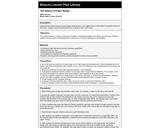
In this lesson, students explore the history of paper money to gain a new appreciation for it.
- Subject:
- English Language Arts
- Material Type:
- Lesson Plan
- Provider:
- Beacon Learning Center
- Author:
- Beacon Learning Center
- Date Added:
- 04/23/2019

In this lesson, students explore the history of paper money to gain a new appreciation for it.

This study of Hobbes, Locke, Montesquieu, and Rousseau is designed to give students an understanding of the ideas of these four philosophers and is also an opportunity for them to reflect on humanity's need for order and efforts to create stability within the social community. In the first part of the unit, activities focus student awareness on the nature of government itself and then progress to close reading and writing centered on the specifics of each philosopher's views. Large-group and small-group discussion as well as textual evidence are emphasized throughout. In the second part of the unit, students are asked to engage in creative writing that has research as its foundation. Collaboration, role-playing, and a panel discussion
are fundamental parts of the culminating activity. Options for further writing activities and assessments close the unit.
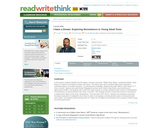
In this lesson, students will identify how Common's rap song "A Dream" and Walter Dean Myers's short story "Monkeyman" reinterpret Martin Luther King Jr.'s dream of nonviolence. Students will delve into a text-based discussion on characterization and conflict, as well as compose an essay on the Six Principles of Nonviolence (rubric available).
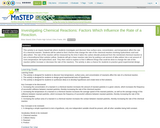
In this activity, students investigate and discover how factors such as surface area, concentration, and temperature affect the rate of a chemical reaction involving hydrochloric acid and antacid tablets. After watching a demonstration of the reaction, students will generate hypotheses for how to change the speed of the reaction, develop procedures for testing their hypotheses, carry out the experiments, and collect data in their lab notebooks/science journals.

In this Penguin Classics guide to William Kennedy's book Ironweed, students will learn the background of the book as well as the author, and deepen their understanding of the text through indepth discussion questions. This indepth reading guide is divided into pre-reading discussion and the establishment of keeping a response journal; questions for understanding the story itself; discussion questions that dig deeper into the meaning; questions for written responses; and post reading discussion questions.
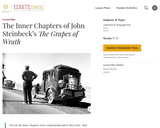
In this three-part lesson on the inner chapters of "The Grapes of Wrath" students will first determine the function of Steinbeck's opening chapter then explore the relationship between the inner chapters and the Joad narrative chapters throughout the novel. Students will view two documentaries along the way as well as read two relevant articles in order to draw their own conclusions about the purpose of this novel's inner chapters.

This one day unit includes an analysis of the sermon "Sinners in the Hands of an Angry God", a sermon writing project, biographical information on Jonathan Edwards and discussion questions.

Students discuss and examine the differences between electronic communication such as texts and emails versus more "traditional" means of writing. There is also a discussion on audience and puropse when writing, and students will practice writing a "style guide" page in order to reinforce conventions of standard English.
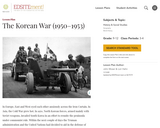
In 1950, North Korean forces, armed mainly with Soviet weapons, invaded South Korea in an effort to reunite the peninsula under communist rule. This lesson will introduce students to the conflict by having them read the most important administration documents related to it.
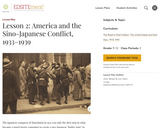
The Japanese conquest of Manchuria in 1931 was only the first step in what became a much larger campaign to create a pro-Japanese "buffer state" in North China. This lesson will examine the overall principles which underlay both Japanese and American foreign policy in the mid- to late-1930s.
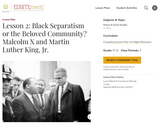
Malcolm X argued that America was too racist in its institutions and people to offer hope to blacks. In contrast with Malcolm X's black separatism, Martin Luther King, Jr. offered what he considered "the more excellent way of love and nonviolent protest" as a means of building an integrated community of blacks and whites in America. This lesson will contrast the respective aims and means of Malcolm X and Martin Luther King, Jr. to evaluate the possibilities for black American progress in the 1960s.

In this lesson, students learn more about the work of the United Nations by researching an issue they care about. The second objective is for students to understand the importance of their voice in the world and how to use social media responsibly in order to share their knowledge with the wider community.

Students will learn about the role of money in the colonial economy by participating in a trading activity in which they observe the effects of too little money on trade within a colony.
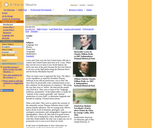
Students will learn to order their thoughts into sequential writing. The students will map a trail around the school and then follow some of Jefferson's instructions for wrtiing detialed reports. Each student then writes a description of an animal after reading Meriwether Lewis's report of the black woodpecker, another "new" creature.
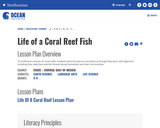
Students research the ways that humans impact coral reef ecology and identify some of the organisms that live in coral reef habitats. They will write a narrative essay as if they are one of these organisms and discuss how they are affected by human activities such as over-fishing, habitat destruction, pollution, etc.

This lesson revisits the original nine African-American children who broke the color barrier at Central High School in Little Rock, Arkansas in 1954. Lessons include close reading and analysis of news reports, television news accounts and writing assignments.

This literacy assessment is based on a chapter from a book about math and how it connects to everyday life and includes one text and ten text-dependent questions and explanatory information for teachers regarding alignment to the CCSS.

In this activity, students investigate the question: "How does the strength of the tension force on a bucket when at the top of a vertical loop compare to the strength of the tension force when at the bottom of the loop?" After completion of the lab, students will complete a formal lab write-up.
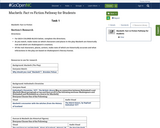
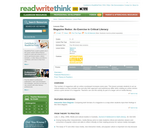
In this lesson, students will reflect and share insights about their impressions and experiences after reading both a print and an online magazine. Students will compare and contrast the structure and format of a print magazine versus an online magazine and delineate some of the factors that contribute to their similarities and differences, as well as compare their approach to reading an online magazine versus a print magazine.